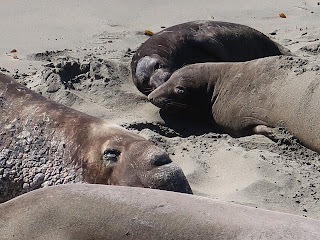The crowds of seals have thinned, leaving pods of weaners
gathering along the bluff edges. Some mothers remain, still nursing their pups.
Beachmaster bulls keep an eye on those last few, ready to mate one more time.
Typical weaners have nursed their way from their birth
weight of about 70 pounds to around 300. They vary – it’s easy to see the
difference. Some are much bigger than others. Most are plump and filled out. They
don’t have to be fat to survive.
The really big ones are superweaners, They’ve been able to
steal milk from other mothers and gain a couple hundred pounds more, achieving
superweaner status. Some are so fat, they can hardly move. Being a fatter
weaner isn’t a plus. The additional blubber may make it more difficult for them
to dive to hunt fish and squid.
Docents sometimes call them Pop Tarts for sharks. Pups make
such attractive food for sharks that the increase in elephant seal pups may be
responsible for the increase in shark attacks on otters. Sharks may mistake the
otters for seal pups, and take a bite. They don’t eat the otter, but the otter
is already dead.
The weaners will all lose some weight before they depart on
their first migration in March and April. Their metabolism changes. Nursing
pups gain weight as blubber. As fasting weaners, they convert the blubber to
muscle and energy. Their blubber will have to support them until they leave the
beach and embark on their first migration, when they start finding their own
food.
The mothers lose about a third of their body weight nursing
their pups. The few remaining on the beech are thin and depleted. The other
mothers have already left on their short migration, for two months, after they
wean their pups. They will be back in May.
A few adult bulls sleep on the beach, hanging around to mate
with the last few females. The males are thin, too. They’ve been on the beach
without food for nearly 100 days. They are still big, but lack the bulk they
brought with them in December.
Sleeping takes the edge off that long fast.
The Marine Mammal Center rescued its first starving pup of
the season February 20.
The volunteers who collected him from Moonstone Beach named
him Kickoff, for kicking off the elephant seal pup season. He was taken to the
Morro Bay facility for supportive care before being sent north to the main
hospital in Sausalito. They bulk him up with seal food and teach him how to eat
fish on his own.
If you see a pup stranded on the beach, call The Marine
Mammal Center to report it, on the rescue line, 805-771-8300. Don’t go near it or touch it. They are wild animals
and even a starving pup has teeth and can bite. Some carry diseases that humans
can catch. Your report is important and you may be asked to help. The person
reporting the stranded animal is usually allowed to name it. Helping save one
of these unusual animals is rewarding.






No comments:
Post a Comment